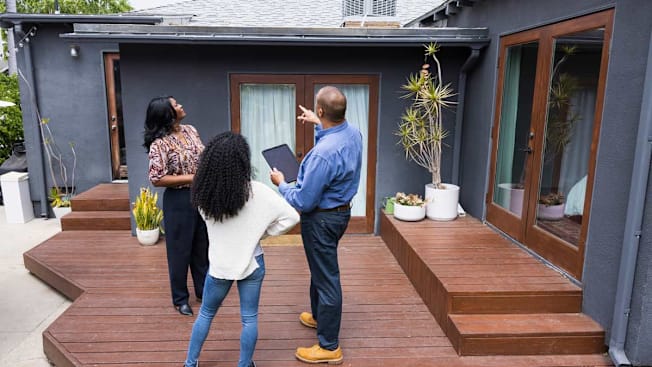How to Choose a Home Inspector
Finding someone great requires looking beyond credentials

Shopping for a home? Don’t wait until you have an accepted offer to shop for a home inspector. You want to allow time to interview several candidates so that you can be sure to hire an experienced professional.
After all, a home inspection is your one opportunity to get a clear-eyed assessment about the true condition of something that, for many, is the most expensive purchase of a lifetime. Follow our advice, informed by industry experts, for how to find good candidates and what to look for in an inspector.
Beware the Real Estate Agent's Referral
Your real estate agent might offer to give you some home inspectors’ names. They may be perfectly well-meaning—or not—but the references present a conflict of interest.
Identify Qualified and Trusted Candidates
To find a reputable inspector, first ask friends who have recently purchased a home whether they recommend the person they used. You can also find referrals through local online communities such as NextDoor or Patch, where members sometimes post about their experiences. A crowdsourced directory such as Yelp and sites such as Angi (formerly Angie’s List) and HomeAdvisor may also be helpful.
If you live in one of the seven metropolitan areas covered by Consumers’ Checkbook, you can check the organization’s ratings of local home inspectors. It covers Boston, Chicago, the Delaware Valley (Pa.), Puget Sound (Wash.), the San Francisco Bay Area, the Twin Cities (Minn.), and Washington, D.C.
Other resources to find inspectors include professional organizations such as the American Society of Home Inspectors (ASHI), the International Association of Certified Home Inspectors (InterNACHI), and the National Academy of Building Inspection Engineers, which certifies professional engineers and architects who do home inspections. Some state organizations, such as the California Real Estate Inspection Association, also have a database of inspectors. Go to each group’s website to find details about the experience and professional certifications of local inspectors and the services they provide.
Once you’ve found a few candidates, search online to see whether there have been any complaints about them. Try doing a web search with the name of the company followed by such terms as “complaints” and “reviews.” Your local Better Business Bureau chapter may also have information on home inspectors you’re considering.
Favor Credentials, but Know Their Limits
Hiring someone who’s certified by a professional organization can give you a bit more assurance that they are knowledgeable.
Among the requirements for certification from ASHI, for instance, candidates must pass an in-person National Home Inspector Examination and document that they’ve done at least 250 paid home inspections. InterNACHI’s certification requirements include having candidates pass its Online Inspector Examination and submit four mock or simulated inspection reports to the organization.
Thirty-five states require inspectors to pass a written National Home Inspector Examination; find out here whether your state offers certification. If it requires licensing for home inspectors, ask to see proof from the inspectors you’re considering hiring.
Keep in mind, though, that certification and licensing don’t ensure a great inspection. In its 2018 undercover investigation, Consumers’ Checkbook hired 12 home inspectors—all state-licensed and certified by a professional group—to inspect a three-bedroom house with 28 known problems. None of the inspectors found all of the problems, which included a leak under the kitchen sink, bad roof damage, and obvious signs of rodent infestation.
“By all accounts, the national exam is a rigorous test, and both professional groups do a pretty good job of ensuring their certified inspectors are knowledgeable,” Brasler says. “But being knowledgeable doesn’t mean the inspector is going to be diligent or conscientious, and that he won’t rush through the inspection.”
In the Consumers’ Checkbook investigation, an inspector rushed through a home in 1½ hours compared with the 2 to 4 hours most inspectors take.
Compare Home Inspection Reports
The best way to determine how thorough an inspector will be—and how well they will communicate the problems found—is to ask for a sample copy of an inspection done on a home like the one you’re considering buying, Brasler says. “The sample report will show how much work they’re going to do,” he says.
After comparing reports from several inspectors, you’ll begin to see which ones are detailed in their observations and which are just filling their reports with generic information, such as the importance of sealing a wood deck or caulking around windows to improve energy efficiency.
In Consumer Reports’ examination of reports from home inspectors across the U.S., we found that the typical one consists of a few dozen pages covering findings on all the major systems in the house and includes photographs and descriptions of documented problems and maintenance suggestions. Some inspectors now post the reports online with videos.
Consider Training and Experience
In addition to professional certifications, look for someone who has been in the field inspecting homes for at least several years. They’re more likely to have seen a variety of home types and a broad range of issues.
“Assuming he does four inspections a week over a five-year period, that’s over 1,000 inspections,” says Richard Haber, a home inspector and licensed architect in Dobbs Ferry, N.Y.
Especially if the home is older, look for an inspector with extra training or credentials, such as an architect’s or home engineer’s license. And be prepared to pay more.
Ask What You Get for the Price
Inspectors without specialized credentials typically charge around $300 to $1,000, depending on the home’s location and size, the inspector’s experience, and the scope of the inspection itself. You’ll want to get a clear understanding of what that particular inspector’s services include before making a commitment.
Some inspectors will add free services not covered by a basic inspection, such as using a drone to view the roof or placing an infrared camera on walls, ceilings, and floors to measure temperature differences that suggest the presence of damaging moisture. Others will charge extra for those services. Still others will refer you to an outside expert to do that work.
Be aware that you may have to pay extra for specialized tests that aren’t covered by the initial home inspection. Common risks that may need more testing include termites, radon, and mold.


